Steve Garvey Guests
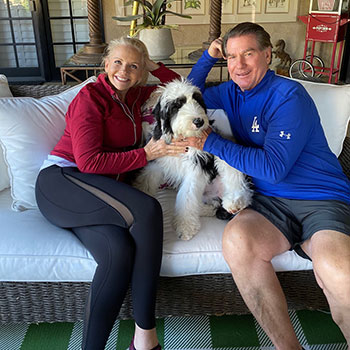 Legendary first baseman Steve Garvey is back to explain his relationship with his 140-pound Rottweiler named Spartacus, among other things. Steve shares his home with Bear and Charlotte, two Cocker Spaniels, as well as Spartacus. Steve says Spartacus is 140-pounds and can sleep pretty much anywhere he wants to, just not on the bed!
Legendary first baseman Steve Garvey is back to explain his relationship with his 140-pound Rottweiler named Spartacus, among other things. Steve shares his home with Bear and Charlotte, two Cocker Spaniels, as well as Spartacus. Steve says Spartacus is 140-pounds and can sleep pretty much anywhere he wants to, just not on the bed!
Steve works closely to help the Lucy Pet Foundation score a home run. Steve met Joey Herrick, founder of The Lucy Pet Foundation, in 2010 when Joey contacted the Dodgers to see if Steve would coach his son's traveling team. Joey was a season ticket holder for the Dodgers and loves baseball just as much as Steve loves dogs, so they were a "Match Made in Heaven."
Joey and Steve both worked together when Joey owned Natural Balance Pet Food, and Steve tells us that Natural Balance was the one who started the Bark In The Parks, where dogs were allowed to attend baseball games. Over about a four or five-year period, they conducted around fifty of them. Some of the ballparks where these were held were the Texas Rangers Ballpark, City Field in New York, Dodger Stadium and the AT&T Ballpark in San Francisco. The concept is simply to bring your dog to the game. About two hours before the start of the game, a pup rally is usually held. They also held contests such as dogs that looked like their owners, the biggest and smallest dogs, and the best themed costumes. Then about 45 minutes before the game, they would parade the dogs around the warming track on the stadium. These events are extremely popular.
The Mission of The Lucy Pet Foundation is to reduce pet overpopulation by having mobile spay/neuter clinics across the country and to support causes that benefit animal welfare. The Lucy Pet Foundation's buses travel around Southern California focusing on spaying and neutering. These buses are state of the art surgery units.
The Lucy Pet Foundation not only offers free and reduced spays and neuters, they also do microchipping, vaccines and de-wormings. Spaying and neutering is not only great for pet population control, but it has been proven that an animal will live on an average of 40-percent longer after having this surgery.
Visit Website
Pet Law
Debra Hamilton, Pet Mediator
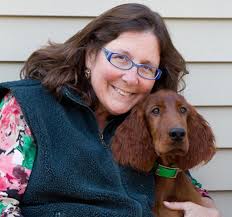 Attorney Debra Hamilton gave up practicing litigation law to focus on the animals. As a mediator, she negotiates peaceful resolutions to pet-related discourse. Besides the obvious, divorce and pet-custody issues, she also deals with bad breeders and pet trusts.
Attorney Debra Hamilton gave up practicing litigation law to focus on the animals. As a mediator, she negotiates peaceful resolutions to pet-related discourse. Besides the obvious, divorce and pet-custody issues, she also deals with bad breeders and pet trusts.
Debra Hamilton is a pet mediator in Westchester County, New York. If you've ever been through a divorce, you might have used a mediator to work things out and save money. This is exactly what Debra does, and she usually does it for people with pets who are divorcing.
Most of the time people can deal with splitting the furniture and the kids, but the dog, not so much, states Debra. It is usually the last best thing they did together so each of them want to keep it or they want to make sure you pay for it if you're going to keep it. But in the rare case where no one wants the dog, Debra can help them find someone who can give the pet a good home, because there is usually someone they've never considered. She also helps people make plans for their pets if something happens to them.
Other types of cases that Debra deals with are people having issues with breeders or with their handlers if they have show dogs. This could be someone who is having an issue with a dog that they've purchased from a breeder, because the AKC doesn't get involved in any civil suit between a breeder and an owner. It costs a lot of money to take a case to court, and if, for example, you've paid $1,500 for a dog, are you going to spend $10,000 to get your $1,500 back if you go to court? She also deals with barking dogs, dog park issues, groomer issues and veterinary malpractice, issues that can result in emotional upheaval and steep legal fees.
Both parties pay half of what Debra charges in a mediation. Debra is a neutral who will help you come to a resolution that works for both sides. It is a win-win.
If Debra has a case that can't be settled by her in mediation and it goes to court, there is actually less time spent in court and less money involved, because they've had their say in mediation and the judge just needs to decide the last few things that they couldn't agree on.
While animal law has gained prominence in recent years as pet ownership has become more popular and involved, so has the sophistication of dealing with them - and the legal woes they can bring.
Debra also believes that everyone should have a pet trust. You really need to make a plan before you pass and after you pass, or otherwise your pets might be set adrift.
Visit Website
Using Cats to Fight Cancer
Rachel Gitlin, Cats vs. Cancer
 Everybody loves cat videos. Rachel Gitlin figures that the creation of Cats vs. Cancer, will use the power of cat videos to raise money, through advertising, to help assist in the fight against human cancer. She'll explain the model and tell you how you can help too.
Everybody loves cat videos. Rachel Gitlin figures that the creation of Cats vs. Cancer, will use the power of cat videos to raise money, through advertising, to help assist in the fight against human cancer. She'll explain the model and tell you how you can help too.
Cats vs. Cancer has gathered some unique, fun cat content from around the web, putting it on one place. They then use the advertising revenue, along with direct donations, towards cancer research.
Co-Founders Tom O'Connor and Eddie Pena are the ones who have the fun gathering this cat information from the web.
The time you spend on their site enjoying cat videos goes to a good cause, which is a first of its kind. They launched December 1, 2015 and they try to gain traction and as much visibility as they can, and invite everyone to come spend time on their site.
 They partner with a different charity. They have a common goal with these charities, as most of these charities are small and are looking to get some awareness themselves.
They partner with a different charity. They have a common goal with these charities, as most of these charities are small and are looking to get some awareness themselves.
The charities they've worked with so far help ease the financial burden of people with cancer by helping them with household bills, helping them with rehab and even helping their families.
Just by spending time on their site, they receive money from the advertisers. You don't have to donate anything. Just go on and enjoy the content and share it with your friends on social media. The time that you spend on their site generates dollars based on the advertising. You can, of course, donate directly as well if you'd like.
Cats vs. Cancer is a non-profit Web site run entirely by volunteers.
Visit Website
Get Your Pet To the Vet Safely with No Escapees - Dr. Debbie
 A frightening situation occurred at my veterinary hospital. Working inside my office, I heard a woman's shrieks coming from the parking lot. I ran outside to find a woman with one dog on a leash and the other dog skittering about the parking lot - the result of a slipped collar. The owner would approach the panicked dog and he'd retreat, darting under nearby cars. Those familiar with our hospital location understand its proximity to a busy intersection. Should the dog run in the wrong direction, he'd meet up with 45 mph traffic.
A frightening situation occurred at my veterinary hospital. Working inside my office, I heard a woman's shrieks coming from the parking lot. I ran outside to find a woman with one dog on a leash and the other dog skittering about the parking lot - the result of a slipped collar. The owner would approach the panicked dog and he'd retreat, darting under nearby cars. Those familiar with our hospital location understand its proximity to a busy intersection. Should the dog run in the wrong direction, he'd meet up with 45 mph traffic.
My staff was outside in moments to assist the owner in retrieving her dog and safely escorted everyone into the building. Thankfully, my client's few minutes of terror ended uneventfully. But that's not always the case. I've seen dogs run straight into the road, cat's leap from a family member's arms, and owners dive into oncoming traffic trying to catch an escaping pet.
The lesson is simple. Don't underestimate your pets' fears. Fear of car travel, new places or the veterinary office can cause a pet to behave in unpredictable ways. If you know your pet to be nervous with new people or new situations, be especially vigilant when transporting your pet in a vehicle.
Identify Your Pet
Use two methods of identification for best insurance your pet is returned to you if lost. Permanent identification with a microchip is a must and should be complimented with a collar and ID tags.
Restrain Pet in Vehicle
Keep your pet secure during travel and when the car door opens by using a doggie seatbelt. Small dogs and cats should be housed in a pet carrier which is secured with seatbelt to avoid undue carrier movement during travel. Do not allow cats and small pets to roam freely in the car. Cats have been known to take cover under car seats which may require sedation or seat removal to extract kitty from her hiding place.
Check for Proper Fit
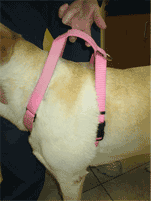

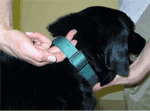 A proper fitting collar allows 2 finger widths between the collar and pet's neck. Allow more than, and should your pet put on the brakes, he'll easily slip out of the collar. Poor fitting harnesses are just as dangerous and allow gap room which allows a back-peddling pet to wiggle out. Not sure if the collar is too loose? Snug the collar up one fitting in anticipation of your trip to the vet.
A proper fitting collar allows 2 finger widths between the collar and pet's neck. Allow more than, and should your pet put on the brakes, he'll easily slip out of the collar. Poor fitting harnesses are just as dangerous and allow gap room which allows a back-peddling pet to wiggle out. Not sure if the collar is too loose? Snug the collar up one fitting in anticipation of your trip to the vet.
Try Other Collar Styles
Even if you don't normally use a choker or pinch collar, consider using one when going to the vet's office. For thick necked dogs with smaller head size, try the Martingale collar, a fabric and metal combo collar that snugs down should your dog try to back out. Boisterous dogs that jump and leap when on leash may benefit wearing a head collar that fits over the muzzle. Ensure your collar choice is properly fitted, since any of these styles can fail if improperly fitted or used incorrectly.
Call Ahead
If you anticipate difficulties getting your pet to the vet's office, call ahead. Veterinary staff members are on the ready to help ensure your pet's visit is a safe one.
So, take a few minutes to consider your pet's travel safety before heading out on that next car trip, whether it is to the park, groomer or veterinary office. Your four legged friend will thank you, but may pout on the way there.
Featured veterinarian known as "Dr. Debbie" on national pet radio program, Animal Radio. Ebook author of "Yorkshire Terriers: How to Be Your Dog's Best Friend"; "Pugs: How to Be Your Dog's Best Friend"; "Mini Schnauzers: How to Be Your Dog's Best Friend"; and "Shih Tzu: How to Be Your Dog's Best Friend." Dr. Debbie's books.
Visit Website
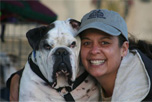 Animal Radio News - Lori Brooks
Animal Radio News - Lori Brooks
Link Between Cats and Human Schizophrenia?
Looking for a link to help explain mental illness, research shows that growing up with a family cat is a commonality among people who develop schizophrenia. Of course, this research merely shows a link rather than a cause, but researchers theorize that the parasite Toxoplasma Gondi (T. Gondi), which is found in cats and can be passed on to humans, could play some role in the development of the mental illness. In addition to schizophrenia, T. Gondi is linked to miscarriages, fetal development disorders and blindness and, in extreme cases, death. Although the Centers for Disease Control and Prevention estimate that more than 60 million people in the U.S. have T. Gondi, people with strong immune systems generally don't show any symptoms. Researchers suggest keeping cats indoors, since T. Gondi can be transmitted through neighboring cats, and keeping litter boxes covered, since T. Gondi can be transmitted to humans if they accidentally come in contact with cat feces. Owning a cat comes with plenty of benefits and cat owners are less likely to die of a heart attack.
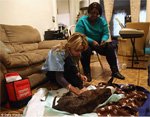 Saying Our Final Goodbyes At Home
Saying Our Final Goodbyes At Home
As we humans become closer to our pets, our ways saying goodbye to them are at long last evolving. All signs are showing that many people are now choosing to have their animal companions put down at home, as we become more sensitive to what our pets might be thinking and feeling, and it's creating a fast growing in demand service. One online directory of veterinarians who perform in-home euthanasia services reports it has grown more common over the past five years and increasing on a regular basis.
Here's A New Twist On Pet Allergies
Air pollution has always been problematic for people with allergies and asthma, but research from Canada shows that exposure to traffic-related pollution, specifically in the first year of life, could actually increase a child's chances of developing allergies to foods, mold, pets and pests. Researchers looked at data from more than 2,400 children and skin-tested them for 10 common allergens including cats and dogs, at one year of age. They also measured levels of nitrogen dioxide, a key component of traffic pollution, in their homes. What they found was that those who became sensitized to allergens tended to have higher exposure to traffic exhaust. And while other studies have linked heavy traffic with asthma in kids, this research links air pollution and measured allergic sensitization during some of the earliest stages of life.
 Dogs Help Mourners At Funeral Homes
Dogs Help Mourners At Funeral Homes
Dogs are used in all kinds of ways to help humans. Funeral directors say dogs, especially trained therapy animals, can lighten the often awkward, tense atmosphere at a wake or funeral service and sometimes seem to know exactly who needs their help. Turns out that dogs are increasingly being offered as a source of comfort to mourners at American funeral homes. Statistics aren't kept, but a spokeswoman for the National Funeral Directors Association, said, "We hear from members that more and more of them are bringing animals into funeral homes, be it a dog or a cat, whether it's a certified therapy dog or just an extremely well-behaved family pet."
Final Resting Place Next To Your Pet
We're not trying to be morbid, but if you had to be laid to rest somewhere, wouldn't it be much better to be resting next to your pets who passed before you? That is exactly what some people in Germany are able to do. After too many requests to count, the German Cemetery Association started offering pets and people adjoining urn space. Although the ashes of pet owners and their animals have the chance to sit side by side, cremations are still legally required to be carried out separately. Germany is home to 35 million pets, the third largest number in Europe. A study suggested that Germany has the lowest birthrate in the world. As that number continues to plummet, cuddly critters look set to become an even more integral part of the family.
 Listen to the entire Podcast of this show (#1270)
Listen to the entire Podcast of this show (#1270)





